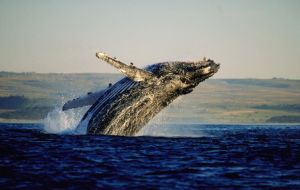MercoPress. South Atlantic News Agency
Record death of whales and calves in Patagonia; scientists investigating
 Whales at Peninsula Valdes, an annual spectacular sight
Whales at Peninsula Valdes, an annual spectacular sight Southern Right Whales are dying off at a record rate in Argentina's Patagonia region, a conservation group warned.
“In the year 2012, there were 116 whale deaths reported, including 113 whale calves” the Buenos Aires-based Whale Conservation Institute ICB said, adding that it was nearly double the 61 whale deaths it recorded in 2011.
The 2012 deaths represent about three percent of the population of these whales in the South Atlantic, estimated at 4,000, the ICB said.
Every year starting in June, hundreds of the South Atlantic Right Whales -- Eubalina Australis -- take cover in the bays of the Valdes peninsula, a UNESCO world heritage site, where they come to calve.
Thousands of tourists travel to see the nursery phenomenon each year.
The whales, about 14 meters long and weighing up to 50 tons, have been dying for reasons scientists do not yet fully understand.
But the NGO believes they include climate change leading to less krill, and gulls eating chunks of skin off living whales, which can cause infections.




Top Comments
Disclaimer & comment rules-

-

-

Read all commentsIf starvation-related conditions are the proximal reasons, these should be readily identified in autopsy, as should the ultimate reason - starvation.
Jun 05th, 2013 - 11:47 am 0For species that 'feed for half a year and breed for the other half', starvation is an annual cyclical risk.
There could be a delayed feedback link as well as a fishing link.
If squid population levels are influencing krill levels we might expect some longer-term rebalancing of krill-feeding whale species and squid-feeding whale species.
Human influences, particularly through fishing and additive climate change, are complex and it is not sensible to guess what marine research organisations might come up with.
Certainly though, if coastal melt-water from glaciers in the Antarctic Peninsular is becoming increasingly influential in lowering surface salinities, this will impact on the krill's diurnal vertical migration into those surface waters and alter krill biomass, with its inevitable impact on krill-feeding whales.
Cue “It's all Argentina's fault” in 3, 2, 1...
Jun 05th, 2013 - 02:46 pm 0(of course, this species of whales is basically EXTINCT in the North Atlantic... which two filthy continents full of filthy murderous societies share this ocean??????)
#3
Jun 05th, 2013 - 06:54 pm 0Yes, your ancestors have something to answer for.
Don't you feel ashamed to be genetically linked ?
Cut your throat and do us all - including fellow Argentinians-a big favour.
Commenting for this story is now closed.
If you have a Facebook account, become a fan and comment on our Facebook Page!